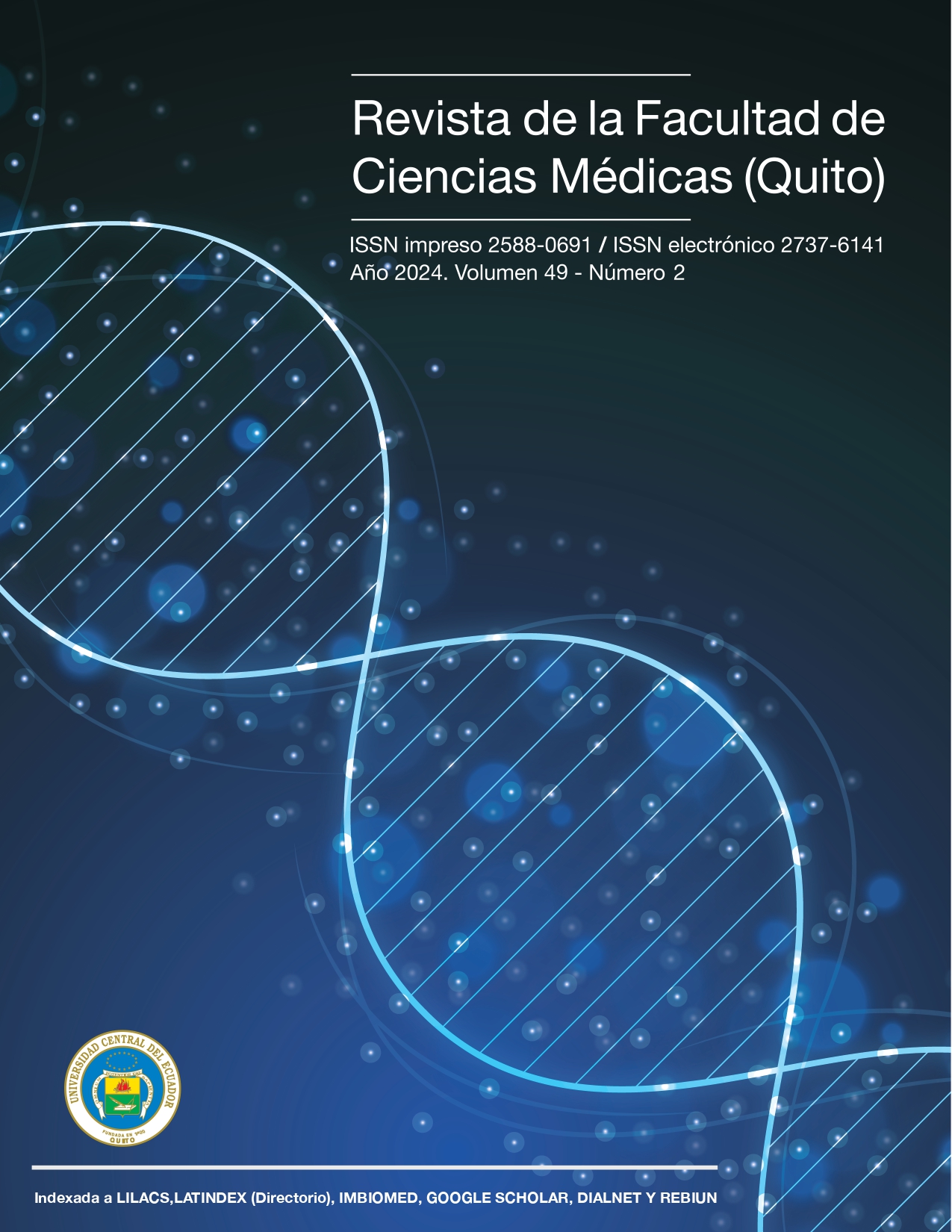The artificial intelligence, a challenge in the field of health
DOI:
https://doi.org/10.29166/rfcmq.v49i2.6771Keywords:
artificial intelligence, health sciences, medical informaticsAbstract
The advancement of technology has rapidly transformed society, especially in the field of healthcare, where artificial intelligence has aroused great interest due to its various applications. Several areas, including health sciences, that utilize these systems have considered it essential to incorporate these tools into their field. Thus, over the decades, artificial intelligence has been used in medicine, from interpreting electrocardiograms to analyzing large datasets for diagnoses, treatments, and guiding public policies. In the field of medical sciences, two main branches of application are identified: a physical one, which supports medical personnel in patient care, and a virtual one, which focuses on research and public health. Although artificial intelligence can alleviate the burden on healthcare staff, it poses risks such as the loss of direct contact between doctors and patients, as well as ethical dilemmas regarding the privacy of health data, making it essential to continuously evaluate its implementation and reflect on its ethical and social implications. While its benefits are acknowledged, it is crucial to critically address its potential impacts and ethical concerns.
Downloads
Metrics
References
Expósito MC, Ávila R. Aplicaciones de la inteligencia artificial en la Medicina: perspectivas y problemas. ACIMED [Internet]. 2008 [Cited May 16, 2024];17(5): Available from: http://scielo.sld.cu/scielo.php?script=sci_arttext&pid=S1024-94352008000500005&lng=es.
Fuchs D. The Dangers of Human-Like Bias in Machine-Learning Algorithms. Missouri S&T’s Peer to Peer [Internet]. 2018 [Cited May 2, 2024];2(1). Available from: https://scholarsmine.mst.edu/peer2peer/vol2/iss1/1
Douglas D, Brown E. Artificial Intelligence in Medical Practice: The Question to the Answer?. The American Journal of Medicine [Internet]. 2018 [Cited May 3, 2024].
Available from: https://doi.org/10.1016/j.amjmed.2017.10.035
Lanzagorta-Ortega D, Carrillo-Pérez D, Carrillo-Esper R. Inteligencia artificial en medicina: presente y futuro. Gac. Méd. Méx [Internet]. 2024 [Cited May 16, 2024];158(1). Available from: https://doi.org/10.24875/gmm.m22000688
Nayarisseri A, Khandelwal R, Tanwar P, Madhavi M, Sharma D, Thakur G, Speck-Planche A, et al. Artificial Intelligence, Big Data and Machine Learning Approaches in Precision Medicine & Drug Discovery. Current Drug Targets [Internet] 2021 [Cited May 3, 2024]; 22 (6) 631-655. Available from: https://www.eurekaselect.com/article/113033
Monlezun D, Sotomayor C, Peters N, Steigner L, Gallagher C, García A. La ética global de la IA en la recuperación del COVID-19: revisión narrativa y análisis ético del Contrato Social Personalista de la optimización de la eficacia de la salud pública y la equidad social impulsada por la IA. Med. ética [Internet].2022 [Cited May 16, 2024]; 33(2)357-394. Disponible en: https://doi.org/10.36105/mye.2022v33n2.02
Lanzagorta-Ortega D, Carrillo-Pérez D, Carrillo-Esper R. Inteligencia artificial en medicina: presente y futuro. Gac. Méd. Méx [Internet]. 2022 [Cited May 16, 2024];158(1): 17-21. Available from: http://www.scielo.org.mx/scielo.php?script=sci_arttext&pid=S001638132022001100017&lng=es.
Rada G, Letelier LM. ¿Podemos mantenernos actualizados en medicina en el siglo XXI? Rev Med Chile [Internet]. 2009 [Cited May 16, 2024];137(5):701-708. Available from: http://dx.doi.org/10.4067/S0034-98872009000500016
Hamet P, Tremblay J. Artificial intelligence in medicine. Metabolism Clinical and Experimental [Internet]. 2017 [Cited May 2,2024];(69):36-40. Available from: http://dx.doi.org/10.1016/j.metabol.2017.01.011
Juravle G, Booudouraki A, Terziyska M, Rezlescu C. Chapter 14 - Trust in artificial intelligence for medical diagnoses. Progress in Brain Research [Internet]. 2020 [Cited May03,2024]; (253) 263-282. Available from: https://www.sciencedirect.com/science/article/abs/pii/S0079612320300819?via%3Dihub
Avila-Tomás J, Mayer-Pujadas M, Quesada-Varela VJ. La inteligencia artificial y sus aplicaciones en medicina I: introducciones antecedentes a la IA y robótica. Atención Primaria [Internet]. 2020 [Cited May 1, 2024]; 52(10):778-784 Available from: https://www.elsevier.es/es-revista-atencion-primaria-27-articulo-la-inteligencia-artificial-sus-aplicaciones-S0212656720301451
Capogrosso M, Milekovic T, Borton D, Wagner F, Moraud EM, Mignardot JB, et al. A brain-spine interface alleviating gait deficits after spinal cord injury in primates. Nature [Internet]. 201610;539(7628):284-288. Available from: DOI: 10.1038/nature20118. PMID: 27830790; PMCID: PMC5108412.
Pegoraro E. Convocatoria de Roma por la Ética de la IA: el nacimiento de un movimiento. Med. etic [Internet]. 2023 [Cited May 1, 2024]; 34(2). Available from: https://doi.org/10.36105/mye.2023v34n2.01
Downloads
Published
How to Cite
Issue
Section
License
Copyright (c) 2024 Indira López; Dra. Nathaly Rosales, Gabriel Miño Rodríguez, Ana María Freire Erazo

This work is licensed under a Creative Commons Attribution-NonCommercial-NoDerivatives 4.0 International License.










